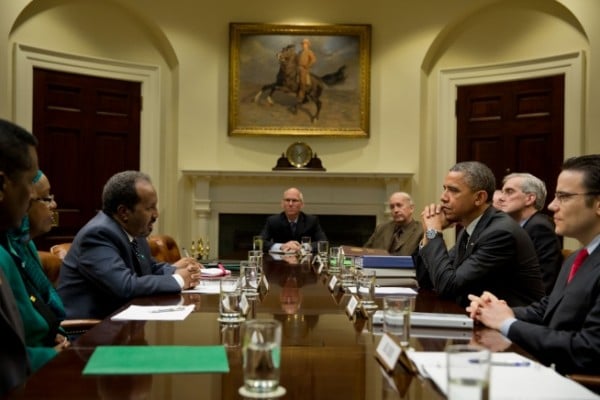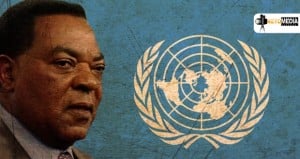
Somalia President, Hassan Sheikh Mohamud with President Obama (2013).
Last week I shared the highlights of my interview with Ambassador Augustine P. Mahiga, the former head of the United Nations Political Office for Somalia and special representative of the U.N. Secretary General for Somalia (Part I of the interview here). In the first part of the interview, he spoke about his role in the Somalia peace process and his optimism for peace and development in arguably the most tormented country in the world. In this second part of my two part interview with Ambassador Mahiga, he shares his thoughts on what other initiatives are needed to help Somalia to develop and the reasons why international firms should explore opportunities to invest in Somalia’s people and natural resources.
Is the new government credible and capable of fostering a new era of peace and development in Somalia?
I was confident by the time I left that the new leadership that we put in place through a very credible process had a vision, and has the quality of leadership needed at this juncture. Also, the government needs to be empowered to establish capable government institutions that are not only accountable, but are able to put in place a functioning government. The collapse of Somalia was real. I think the first challenge, even before you think of a security arrangement, is to have capable leadership that can put together a functioning government. Lastly, one of the most important requirements is that this government must work to restore the confidence of the Somali people, shattered over the past 20 years, and to restore their pride. This will create allegiance and a compact between the government and people. In order to have that, the prerequisite is to have security and stability in the country.
What are your thoughts on the government’s ability to manage internal security threats?
The security aspect of it is so challenging that Somalia alone, which is just beginning to build its own security institutions , has not been able to be equal to the strength and challenge of Al-Shabaab, which is internationally supported by many Jihadist groups. The African Union Mission In Somalia (AMISOM) has almost reached the limits of its performance because of lack of troop numbers and military assets such as helicopters. It took them so long to clear Al-Shabaab from Mogadishu, the capital city, because they did not even have a single helicopter. Further, while we are building the Somali forces at a very slow pace, Al-Shabaab is consolidating and capable of still contacting terrorist groups inside Mogadishu and in Somalia, and—as we witnessed lately—outside the boundary of Somalia into neighboring Kenya.
What will it take for the Somalia government to build the capacity needed to take on Al-Shabaab?
The Somali forces have to be built literally from scratch. But there is a very peculiar situation in that you build a force, but before you even begin to establish the proper command and control, you deploy troops to the frontline to fight. So yes, command and control is something that is missing, and building the Somali forces from scratch. Also, one challenge to building the Somalia force is that the various militia that have been in the country fighting against Al-Shabaab and the allies of AMISOM need to be integrated in the Somali army.
What should be the role of neighboring states, and the West, in the security calculus?
It is very important that the neighboring states and the international community help the government increase its ability to counter Al-Shabaab, because from what I witnessed, especially in Mogadishu before Al-Shabaab left, the group was capable of waging conventional war as well as terrorist acts. They had arsenals and seasoned foreign fighters from Afghanistan, from Iraq, from Pakistan and, of course, even from North America and Europe. It was not just a ragtag terrorist organization. They were able to pin down a conventional army and fight back very effectively. Now that they have been pushed out and degraded from the conventional standpoint, they however, are very capable of organizing very effectively and coordinating terrorist actions inside Mogadishu, and in other parts of Somalia.
Do you believe the West, the United States in particular, is doing a good job in helping Somalia to achieve stability and development?
I think the West still has more to do. First of all is to help AMISOM continue to create the territorial space that is needed for the political process and the reestablishment of this government’s present administration. I have already explained the limitations AMISOM is facing. I think more needs to be done, especially in the provision of critical equipment to allow AMISOM to expand. The West also has to enable this government to function. Recently, there was a conference in Brussels where they were speaking about a transparent compact between the government and the international community and there were pledges of up to $630 million dollars. I hope these pledges will translate into assistance to help build government institutions, but more importantly, to enable the government to be able to begin delivering basic services such as education, water, and healthcare. This is an area where the West can be very effective. So there is a need for more humanitarian assistance as well. But probably the most urgent issue that the West can deliver is to answer the question of how to handle Al-Shabaab, not only from the military standpoint, but how they can also help to reintegrate disengaging combatants into society.
What are your thoughts about the recent Al-Shabaab attacks on the Westgate Mall in Kenya a few weeks ago?
I remember when the Kenyans went to Somalia on 15th of October 2011, the Al-Shabaab warned the Kenyans, “You don’t throw stones to another building if you live in a glass house.” They warned that they would seek to retaliate. Why did it take so long? Of course, it needed organization. They needed at the same time to show that they are still alive and kicking. Indeed, they are very hard pressed in Somalia but not too hard pressed. They still have some relative comfort in areas like Barawe and the rural areas where they can plan. They cannot expand and they are definitely squeezed there, but they also have to show that they have a considerable network that exists in neighboring countries. So the problem is not only confined to Somalia, which reminds us that even if we finally defeat Al-Shabaab in Somalia, we shall still have to reckon with the tentacles that have been planted in other Eastern African countries.
Is there a role for the private sector in Somalia?
Somalia needs thousands of workers in various sectors for the provision of services, whether it is education, health, water or agriculture. Also, Somalia is potentially a great private sector destination to create jobs and employment, and this could be the answer for the young people who are running to piracy, international crime or even to domestic crime. How do we create jobs? There are sectors that are essential to begin to create an infrastructure to conduct even humanitarian work. Private sector companies are already operating in less than perfect conditions in countries like Afghanistan or even Iraq. They should come and explore opportunities where they can begin to invest in Somalia. These include marine resources, oil and gas, and even the technology for combating desertification. In these sectors one should not wait for perfect conditions to exist. In fragile peace, you can still bring development. In the same way as when I initiated this process in Somalia, I did not wait for perfect conditions to push for inclusivity and to reach a deal that was legitimate and representative. Similarly, in the reconstruction and development areas, we should not wait for perfect conditions to exist but assist in creating those conditions.
Do you believe that the there is too much hard power focused on Somalia and not enough soft power (i.e., development aid)?
The proportion can and should be reversed, and the opportunities for the reversals are there but we have not been able to explore that. Sometimes we look at shortcuts and go with hard power. It takes a little bit of thinking and creativity to see where the smart and the soft power can be applied, especially when conditions can be intimidating and almost discouraging. That is where the challenge is. It should begin with the kind of thinking that suggests that there are two sides to the approach and one side is overemphasized. Somalia is a country where the soft power really needs to kick in harder and come in faster after almost desperate efforts to change the situation there for the first 22 years. We need to think about something different. Think outside the box.